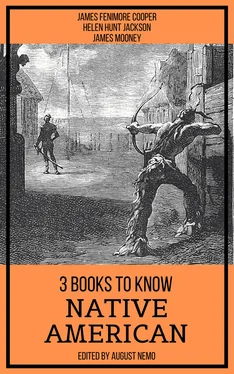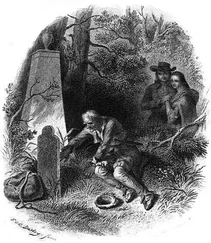At first, the language, as well as the action of Magua, appeared calm and deliberate. When he had succeeded in sufficiently awakening the attention of his comrades, Heyward fancied, by his pointing so frequently towards the direction of the great lakes, that he spoke of the land of their fathers, and of their distant tribe. Frequent indications of applause escaped the listeners, who, as they uttered the expressive “Hugh!” looked at each other in commendation of the speaker. Le Renard was too skilful to neglect his advantage. He now spoke of the long and painful route by which they had left those spacious grounds and happy villages, to come and battle against the enemies of their Canadian fathers. He enumerated the warriors of the party; their several merits; their frequent services to the nation; their wounds, and the number of the scalps they had taken. Whenever he alluded to any present (and the subtle Indian neglected none), the dark countenance of the flattered individual gleamed with exultation, nor did he even hesitate to assert the truth of the words, by gestures of applause and confirmation. Then the voice of the speaker fell, and lost the loud, animated tones of triumph with which he had enumerated their deeds of success and victory. He described the cataract of Glenn’s; the impregnable position of its rocky island, with its caverns, and its numerous rapids and whirlpools; he named the name of La Longue Carabine, and paused until the forest beneath them had sent up the last echo of a loud and long yell, with which the hated appellation was received. He pointed towards the youthful military captive, and described the death of a favorite warrior, who had been precipitated into the deep ravine by his hand. He not only mentioned the fate of him who, hanging between heaven and earth, had presented such a spectacle of horror to the whole band, but he acted anew the terrors of his situation, his resolution and his death, on the branches of a sapling; and, finally, he rapidly recounted the manner in which each of their friends had fallen, never failing to touch upon their courage, and their most acknowledged virtues. When this recital of events was ended, his voice once more changed, and became plaintive, and even musical, in its low guttural sounds. He now spoke of the wives and children of the slain; their destitution; their misery, both physical and moral; their distance; and, at last, of their unavenged wrongs. Then suddenly lifting his voice to a pitch of terrific energy, he concluded, by demanding —
“Are the Hurons dogs to bear this? Who shall say to the wife of Menowgua that the fishes have his scalp, and that his nation have not taken revenge! Who will dare meet the mother of Wassawattimie, that scornful woman, with his hands clean! What shall be said to the old men when they ask us for scalps, and we have not a hair from a white head to give them! The women will point their fingers at us. There is a dark spot on the names of the Hurons, and it must be hid in blood!”
His voice was no longer audible in the burst of rage which now broke into the air, as if the wood, instead of containing so small a band, was filled with the nation. During the foregoing address the progress of the speaker was too plainly read by those most interested in his success, through the medium of the countenances of the men he addressed. They had answered his melancholy and mourning by sympathy and sorrow; his assertions, by gestures of confirmation; and his boastings, with the exultation of savages. When he spoke of courage, their looks were firm and responsive; when he alluded to their injuries, their eyes kindled with fury; when he mentioned the taunts of the women, they dropped their heads in shame; but when he pointed out their means of vengeance, he struck a chord which never failed to thrill in the breast of an Indian. With the first intimation that it was within their reach, the whole band sprang upon their feet as one man; giving utterance to their rage in the most frantic cries, they rushed upon their prisoners in a body with drawn knives and uplifted tomahawks. Heyward threw himself between the sisters and the foremost, whom he grappled with a desperate strength that for a moment checked his violence. This unexpected resistance gave Magua time to interpose, and with rapid enunciation and animated gesture, he drew the attention of the band again to himself. In that language he knew so well how to assume, he diverted his comrades from their instant purpose, and invited them to prolong the misery of their victims. His proposal was received with acclamations, and executed with the swiftness of thought.
Two powerful warriors cast themselves on Heyward, while another was occupied in securing the less active singing-master. Neither of the captives, however, submitted without a desperate though fruitless struggle. Even David hurled his assailant to the earth; nor was Heyward secured until the victory over his companion enabled the Indians to direct their united force to that object. He was then bound and fastened to the body of the sapling, on whose branches Magua had acted the pantomime of the falling Huron. When the young soldier regained his recollection, he had the painful certainty before his eyes that a common fate was intended for the whole party. On his right was Cora, in a durance similar to his own, pale and agitated, but with an eye, whose steady look still read the proceedings of their enemies. On his left, the withes which bound her to a pine, performed that office for Alice which her trembling limbs refused, and alone kept her fragile form from sinking. Her hands were clasped before her in prayer, but instead of looking upwards towards that power which alone could rescue them, her unconscious looks wandered to the countenance of Duncan with infantile dependency. David had contended, and the novelty of the circumstance held him silent, in deliberation on the propriety of the unusual occurrence.
The vengeance of the Hurons had now taken a new direction, and they prepared to execute it with that barbarous ingenuity with which they were familiarized by the practice of centuries. Some sought knots, to raise the blazing pile; one was riving the splinters of pine, in order to pierce the flesh of their captives with the burning fragments; and others bent the tops of two saplings to the earth, in order to suspend Heyward by the arms between the recoiling branches. But the vengeance of Magua sought a deeper and a more malignant enjoyment.
While the less refined monsters of the band prepared, before the eyes of those who were to suffer, these well known and vulgar means of torture, he approached Cora, and pointed out, with the most malign expression of countenance, the speedy fate that awaited her:—
“Ha!” he added, “what says the daughter of Munro? Her head is too good to find a pillow in the wigwam of Le Renard; will she like it better when it rolls about this hill a plaything for the wolves? Her bosom cannot nurse the children of a Huron; she will see it spit upon by Indians!”
“What means the monster!” demanded the astonished Heyward.
“Nothing!” was the firm reply. “He is a savage, a barbarous and ignorant savage, and knows not what he does. Let us find leisure, with our dying breath, to ask for him penitence and pardon.”
“Pardon!” echoed the fierce Huron, mistaking, in his anger, the meaning of her words; “the memory of an Indian is longer than the arm of the pale-faces; his mercy shorter than their justice! Say; shall I send the yellow hair to her father, and will you follow Magua to the great lakes, to carry his water, and feed him with corn?”
Cora beckoned him away, with an emotion of disgust she could not control.
“Leave me,” she said, with a solemnity that for a moment checked the barbarity of the Indian; “you mingle bitterness in my prayers; you stand between me and my God!”
Читать дальше












